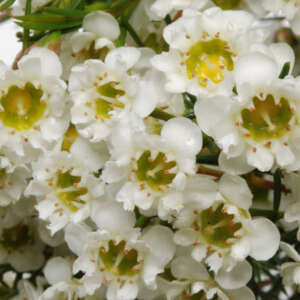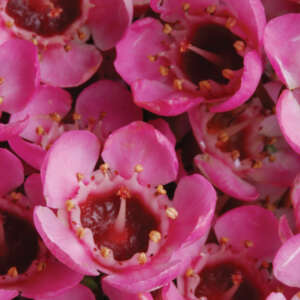Chamelaucium Growing Guide

What is Chamelaucium?
Chamelaucium (Chamelaucium uncinatum) also known as Geraldton Waxflower is a hardy, evergreen shrub. It is part of the Myrtaceae family and is native to Western Australia. It is seen as a medium to large shrub with a fairly open habit. Fine narrow needle like foliage is arranged along the branching stems. When crushed the foliage is highly aromatic. In late Winter to Spring star shape flowers emerge what can be coloured white, pink or purple depending on the variety. The flowers may last well into Summer. Chamelaucium prefers a sunny position in the garden and must have a well draining soil as they are susceptible to root fungus if roots remain wet. They will tolerate a light frost and is drought tolerant once established.
Benefits of Growing Chamelaucium
Chamelaucium have been bred for the cut flower market. In the garden they can be planted as a feature tree or used as a hedge or screen. Like many natives it will attract bees, butterflies and other beneficial insects to your garden as well as honey eating birds.
How to Grow Chamelaucium
Climatic Zones
Cool to mild tropical.
Plant Size
Height: 2m, Width: 1.5-2m
When To Plant Chamelaucium
Plant in late Winter or Spring.
Soil Preparation
They need open sandy or gravelly soil that will provide excellent drainage. If your soil is poorly drained you can either plant it in a raised garden bed or dig through sand or gravel to increase the air capacity in the soil.
How To Plant Chamelaucium
Plant in full sun to light shade, with the plant crown at soil level. If planting as separate trees then have a spacing of at lease 3 to 4m between trees. If making a screen/hedge then plant them 2.5m apart.
Chamelaucium Plant Care
Water regularly to get the plant through the first summer then little to no water is required after that. Once established, they will tolerate periods of extended dryness.
Apply a slow release native fertiliser at the time of planting, and again annually as required during Spring.
Avoid disturbing the roots
Prune significantly after flowering. Prune back by 1/3 each year as a guide.








